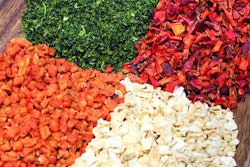
While high temperatures can degrade amino acids in animal-based protein sources used in pet foods, plant-based proteins tend to become more digestible after cooking. This difference matters as minimally processed pet foods become more popular. James Templeman, Ph.D., nutritionist with Primal Pet Foods, discussed differences among plant and animal proteins used in pet food, during Petfood Essentials on May 1 in Kansas City, Missouri.
Scientists have observed that including unprocessed proteins from plants like legumes have a potential negative effect on overall digestibility of dog and cat foods, he said. This effect results from the saccharide content of the plant proteins, as well as anti-nutritional factors such as trypsin inhibitors.
“The nice thing is thermal processing, such as occurs during extrusion, can actually increase and improve the digestibility of these ingredients,” Templeman said.
However, minimally processed pet diets don’t undergo that same level or degree of thermal processing. Fresh, frozen pet foods or other minimally processed diets with high plant protein inclusion may end up with lower relative levels of protein.
Plant protein that haven’t been heat processed contain many antinutritional factors like trypsin inhibitors, phytases and oligosaccharides that will have negating effects on overall digestibility, he said. However, if you heat process a plant protein that will inhibit almost all of those antinutritional factors. It can cause gelatinization of things like starches, if those are existent within your plant proteins.
“You can actually induce quite positive effects on digestibility with heat processing of plant proteins,” he said.
With both plant-based diets and minimal processing growing in popularity among pet owners, the intersection of the two trends needs to be considered by pet food makers.


















